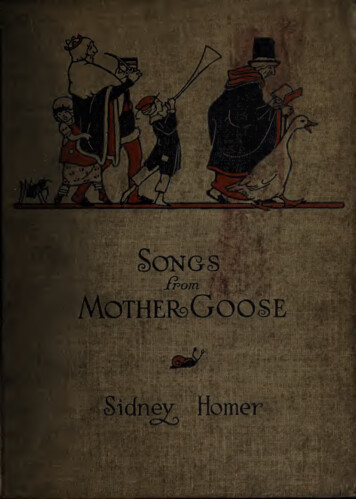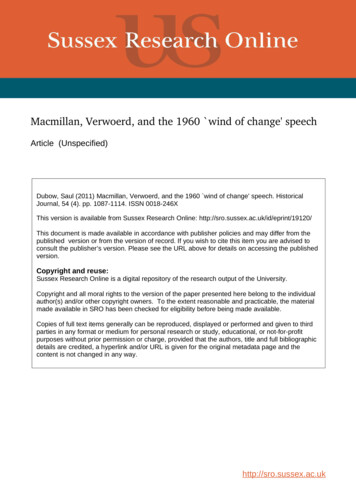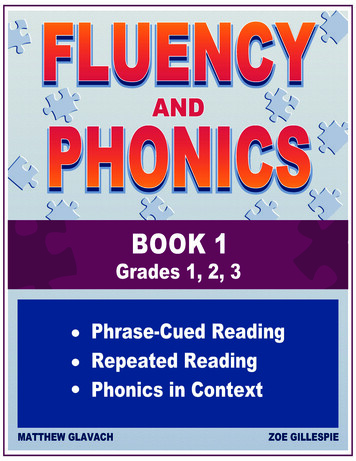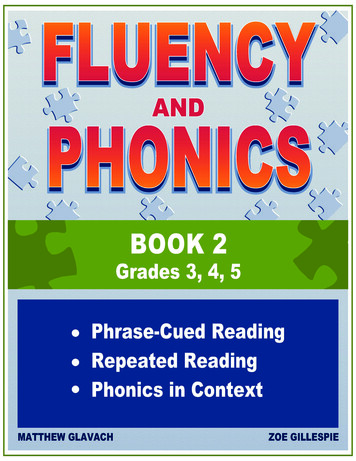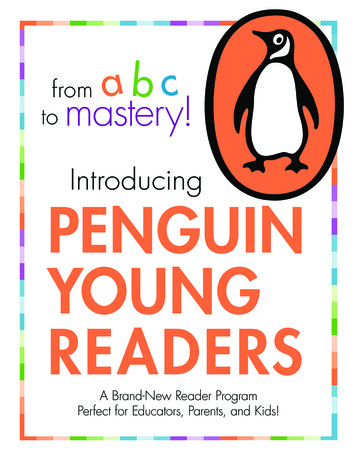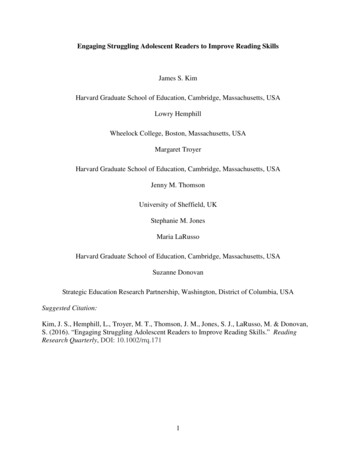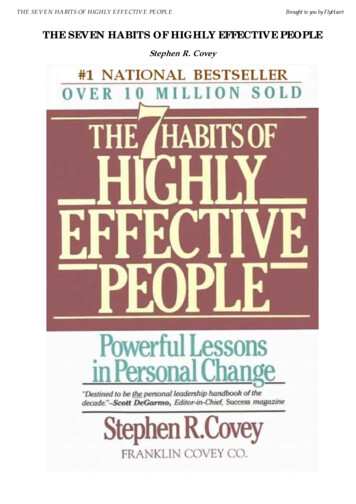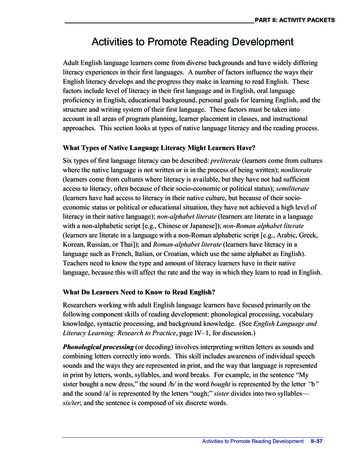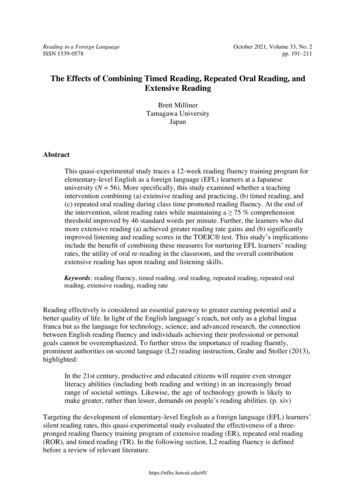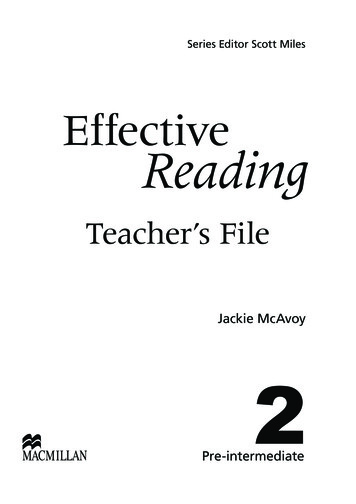
Transcription
Series Editor Scott MilesEffectiveReadingTeacher’s FileJackie McAvoy2Pre-intermediate
Macmillan EducationBetween Towns Road, Oxford OX4 3PPA division of Macmillan Publishers LimitedCompanies and representatives throughout the worldISBN: 978-0-230-02918-7Text Jackie McAvoy 2009Design and illustration Macmillan Publishers Limited 2009First published 2009All rights reserved; no part of this publication may bereproduced, stored in a retrieval system, transmitted in anyform, or by any means, electronic, mechanical, photocopying,recording, or otherwise, without the prior written permissionof the publishers.Note to TeachersPhotocopies may be made, for classroom use, of pages 7–29 (oddnumbered pages only) without the prior written permission ofMacmillan Publishers Limited. However, please note that thecopyright law, which does not normally permit multiple copying ofpublished material, applies to the rest of this book.Designed by Jim Evoy and Julian Littlewood, based on an originalconcept by Designers CollectiveIllustrated by Ed McLachlanThe authors and publishers are grateful for permission toreprint the following copyright material:Macmillan Publishers Limited for extracts from the Macmillan EnglishDictionary for Advanced Learners Workbook; dictionary extracts takenfrom the Macmillan English Dictionary for Advanced Learners of AmericanEnglish. Text Bloomsbury Publishing Plc 2002 and A&C BlackPublishers Ltd 2005; Extract from Liking, Loving and Relating by Susanand Clyde Hendrick, copyright Susan & Clyde Hendrick 1992,used with permission of the authors; Statistical information on Racialdemographics in the U.S. as of 2005 sourced from U.S. Census Bureau.Although we have tried to trace and contact copyright holders beforepublication, in some cases this has not been possible. If contactedwe will be pleased to rectify any errors or omissions at the earliestopportunity.These materials may contain links for third party websites. We haveno control over, and are not responsible for, the contents of such thirdparty websites. Please use care when accessing them.
ContentsIntroduction4–5Notes on First texts, Answer keys and Photocopiable activities6–291Culture shock62Gum: something to chew83Today’s technology104Urban life125Getting away146The piracy business167Accessories of life188Odd jobs209Cybernauts2210 Skincare2411 Sports: past and present2612 From cover to cover28Reviews: Answer key30Vocabulary review31–32Vocabulary review: Answer key333Effective Reading 2Teacher’s FileThis page has been downloaded from www.macmillanenglish.com. Macmillan Publishers Limited 2009.
12IntroductionWelcome to Effective Reading, a four-level reading course speciallydesigned to meet the needs and interests of students studying English inuniversities. Effective Reading is different from other course books of its kindin the following principle ways:High interest reading textsThe main aim of Effective Reading is to provide reading texts of high interestto university students. Too often course books aimed at an internationalaudience contain content that is either uninteresting or simply irrelevantto students, making it difficult for teachers to keep students engaged in thematerial. In Effective Reading, all reading texts have been written specificallyto match the interests of young adults. To increase student interest inreading materials, scholar Anthony Bruton (1997) recommends avoiding‘(a) general topics with the predictable liberal slant, often communicatingnothing that is new; (b) topics of technical or scientific interest to whichnothing can be added; (c) culturally distant and anecdotally irrelevanttopics; and (d) narratives with a high cultural content.’ We took thisadvice to heart when selecting and developing reading texts in orderto maximize student interest, while ensuring that the content is stillappropriate for an academic institution.Reading skills developmentEffective Reading teaches reading skills and strategies to help studentsbecome more efficient and successful readers. Skills such as skimming,scanning and guessing word meanings from context are found in everyunit. Effective Reading also promotes the practice of extensive reading.Information on how to read extensively, as well as extracts fromMacmillan Graded Readers, give students the opportunity to discover thatreading in English at their level of difficulty can be an enjoyable way todevelop reading skills, as well as other language skills.Academic vocabulary developmentUniversity students need to be able to read English materials relatingto their major, and this requires consolidating their existing knowledgeof vocabulary commonly used in academic settings. To reinforce thevocabulary support in Effective Reading books 1–4, the Teacher’s Filesprovide additional vocabulary exercises and tests on words selected fromthe Academic Word List (a list of words which are common in academictexts).Improving vocabulary knowledge is dependent on good dictionary skills.Using examples from the Macmillan English Dictionary, the Teacher’sFile provides dictionary skills exercises to increase students’ familiaritywith English-English dictionaries and to help students use them moreeffectively.4Effective Reading 2Teacher’s FileThis page has been downloaded from www.macmillanenglish.com. Macmillan Publishers Limited 2009.
12Overview of Effective Reading books 1–4Each book is composed of 12 units, with two reading texts per unit. The formatof each unit is as follows:Pre-reading exercisesThese exercises activate the reader’s background knowledge to make the textmore accessible, preview key vocabulary and stimulate interest in the text.First reading textThis is the main reading text of the unit. The core language (vocabulary andgrammar) exercises are drawn primarily from this text.Post-reading exercisesThe first post-reading exercise checks general comprehension of the firstreading text. The second post-reading exercise highlights specific sentences andexpressions from the text, which are typically problematic for learners. Ratherthan waiting for the teacher to explain or translate the text, this exercise givesstudents a chance to find the answers on their own.Language development and speaking exercisesThese exercises provide extended work on essential vocabulary and grammarfrom the first reading text. Only language items which are common in naturalEnglish use are selected, as these are words and structures which students arelikely to encounter again and again in their future English study. The speakingexercises give students the chance to reflect on and evaluate the first readingtext, as well as personalize the content.Second reading text and reading skills workThe second reading text is shorter and slightly simpler in language than the firstreading text. In this section, students further develop specific reading skills suchas skimming, scanning, reading speed, guessing word meanings from context,and so on.5Effective Reading 2Teacher’s FileThis page has been downloaded from www.macmillanenglish.com. Macmillan Publishers Limited 2009.
1Culture shockNotes on First textCulture notesVocabulary notesMany universities in the US and the UK recognize thatforeign students can suffer from culture shock. Thereis always professional staff available and students areencouraged to take advantage of any help offered.Hang out (informal) means to spend time in aparticular place or with particular people.It is perhaps the misunderstanding of ‘normal’ day-today situations that can cause offence, embarrassmentor confusion. The ‘rules’ of behaviour can sometimesbe difficult to understand and contribute towardsculture shock. An awareness of what to expect oftenhelps, but asking what to do in the US or UK is neverseen as losing face.Hang out ( of) means to lean out of a window sothat the top part of your body is outside, as in theillustration on page 9 of the Student Book. (from theMacmillan English Dictionary)To tip is to give somebody some extra money to thankthem for something they have done for you as part oftheir job. Tip is also a noun: I left a tip for the waiter.Foreign (adj) means in or from a country that isnot your own. A person from another country is aforeigner.Answer keyPre-reading 11. b 2. a 3. aPre-reading 21. magazine 2. social life 3. advice4. settling-in 5. culture shockComprehension 12Comprehension 21. c 2. I’m getting used to (the differences)3. c 4. b 5. to turn to someone 6. b7. It made all the difference. 8. a, d and eComprehension 31. get on with 2. make 3. get to know4. hang out 5. miss 6. turn toGrammar 11. the 2. a, Ø, Ø 3. the 4. a 5. Ø6Effective Reading 2Grammar 21. not correct: the advice 2. not correct: a filmclub 3. all correct 4. not correct: an actressActivating vocabulary1. d 2. f 3. e 4. b 5. a 6. cGeneral understandingA 2 (Jordan) B 4 (US) C 1 (France) D 6 (UK)E 5 (Germany) F 3 (Korea)Reading for detail1. The student in France 2. The student inGermany 3. The student in Korea 4. Thestudent in Jordan 5. The student in the UKPronunciation1./ɪd/ 2. /d/ 3. /t/ 4. /t/ 5. /d/6. /t/ 7. /ɪd/ 8. /d/ 9. /ɪd/ 10. /t/Dos and Don’tsThey are all true.Teacher’s FileThis page has been downloaded from www.macmillanenglish.com. Macmillan Publishers Limited 2009.
Photocopiable Activity1Dos and don’tsRead the statements about what to do or what not to do in the USAand the UK. Which ones do you think are true?In the US1. You can touch an American as you talk to them if you know themvery well. For example, you can pat their shoulders, but don’t holdtheir hand.2. Don’t stand too close as you talk to an American or they will moveaway from you.3. If you are a smoker and you are in an American’s home, ask if youcan smoke.4. Say ‘Bless you!’ when someone sneezes.5. Don’t ask too many personal questions when you first meet, forexample ‘How old are you?’6. You can address an American by their first name fairly quickly.In the UK1. Say ‘please’ and ‘thank you’ a lot.2. Always stand in line when you are waiting for a bus.3. Don’t ask questions about money, for example, ‘How much do youearn?’ or ‘How much did you pay for that?’4. Say ‘bless you’ when somebody sneezes.5. If a stranger calls you ‘love’ or ‘dear,’ don’t be surprised or worried.6. If somebody bumps into you, say ‘Sorry.’7Effective Reading 2Teacher’s FileThis page has been downloaded from www.macmillanenglish.com. It is photocopiable,but all copies must be complete pages. Macmillan Publishers Limited 2009.
2Gum: something to chew onNotes on First textCulture notesThe Wrigley Company targets students in itspromotion to sell gum. In the US, Wrigley is the OfficialSponsor of Finals Week. They encourage parents togive their children healthy snacks and chew gum whilethey are revising. Before exam weeks Wrigley visitscolleges and universities across Canada and the US‘to provide places to unwind.’There are schemes in the US and the UK to encouragechewers not to spit out gum. Some places have specialboards where you can stick the gum; other places giveout pieces of paper or plastic bags to put the gum in.In fact, young people also hate the dirty roads causedby chewing gum: it is not just older people who wouldlike to see it banned. In Singapore, although it is nolonger illegal to chew gum, bringing chewing gum intothe country (even small amounts for personal use) isprohibited.Vocabulary notesIf you have tooth decay, your teeth are gradually beingdestroyed, usually because you eat the wrong foods oryou don’t clean them properly.A snack is a small meal or amount of food, usuallyeaten in a hurry. Snack is also a verb: It’s better tosnack on fruit than chocolate.Stress is pressure or worry caused by the problems insomebody’s life.Answer keyPre-reading 11. real 2. memory 3. brain 4. stress 5. beatActivating the topic1. swallow 2. bite 3. chew 4. spitPre-reading 2Student’s own answers.Responding to the text1. a 2. b 3. aComprehension 11. Yes 2. Yes 3. No 4. No 5. Yes 6. YesIdentifying facts and opinions1. F 2. O 3. F 4. O 5. F 6. OComprehension 21. five 2. 50 3. two 4. three 5. sixVocabulary in context1. is 2. are 3. is 4. is 5. are 6. isComprehension 31. without doubt 2. manufacturer 3. freshbreath 4. coming up 5. one-third 6. b 7. a8. a 9. instead of 10. keep away (from)Pronunciation2. and 3. are pronounced /U/. The rest arepronounced /u/.Comprehension 41. up 2. under 3. between 4. of 5. awayGrammar 11. Yes, I am or No, I’m not 2. Yes, I do or No, Idon’t 3. Yes, (s)he does or No, (s)he doesn’t4. Yes, they do or No, they don’tThe chewing gum quiz1. The Wrigley Company 2. You shouldn’tswallow it. 3. No, you can’t. The cocoa butterin chocolate is too soft. 4. Between 15 and 24years old 5. In the 1860s 6. 13 million7. China 8. People who want to quit smoking9. People chewed a kind of gum 9,000 years ago!10. Mint, but now you can get fruit flavours too.Grammar 21. What are the annual sales of gum in the USA?2. Why do some people chew gum? 3. Whatdoes chewing gum not do? 4. Who is under alot of stress? 5. When is a good time to study?8Effective Reading 2Teacher’s FileThis page has been downloaded from www.macmillanenglish.com. Macmillan Publishers Limited 2009.
2Photocopiable ActivityThe chewing gum quizAnswer as many questions as you can. Then match the questions tothe answers given below.1. What is the name of the largest manufacturer of chewing gum in theworld?2. What do people say you shouldn’t do with gum?3. Can you buy chocolate-flavored chewing gum?4. What is the average age of someone who chews gum?5. When was our modern chewing gum born?6. How many sticks of chewing gum are chewed every day in the UK?7. Which country chews two billion sticks of gum every year?8. Who chews nicotine gum?9. When did people start chewing gum?10. What is the most common flavour of chewing gum?Answers13 millionBetween 15 and 24 years oldNo, you can’t. The cocoa butter inchocolate is too soft.People chewed a kind of gum 9,000years ago!ChinaIn the 1860sPeople who want to quit smokingMint, but now you can get fruitflavours too.The Wrigley CompanyYou shouldn’t swallow it.9Effective Reading 2Teacher’s FileThis page has been downloaded from www.macmillanenglish.com. It is photocopiable,but all copies must be complete pages. Macmillan Publishers Limited 2009.
3Today’s technologyNotes on First textCulture notesVocabulary notesThe use of podcasts began as an extra resource fordistance learning students who were unable to attendreal lectures. They proved so popular that they arenow available for campus-based students at someuniversities in both the USA and the UK. Podcastsare also available on EFL/ESL websites for students toimprove their listening skills.Digital (adj) means storing information such as soundor pictures as numbers or electronic signals.Vinyl records can still be bought worldwide. In aCanadian survey in 2006 most teenagers said theypreferred records because of their sound and theircovers. In Japan there are DJ schools where it ispossible to learn how to spin and mix vinyl records.To follow has different meanings. Here it meansto understand an explanation or the meaning ofsomething.Support in this context means help andencouragement. Support is also a verb: My teacherssupported me at my school.Answer keyPre-reading 11. lecture 2. review 3. concentrate 4. podcast5. earphones 6. download 7. libraryActivating vocabulary1. CD 2. DJ 3. cassette 4. vinyl record5. speakers 6. record playerComprehension 11. b 2. b 3. cGeneral understanding1. No 2. Yes 3. Yes 4. No 5. YesComprehension 21. e 2. d 3. a 4. b 5. f 6. cUnderstanding references1. ms kitty 2. niceguy 3. ms kitty 4. niceguy5. niceguy 6. PocahontasComprehension 31. Hilary is sitting upstairs 2. makes (s.o. dosth.) 3. b 4. a 5. How do they feel about this?6. I can’t always follow 7. a 8. on the move9. (to be) in two mindsComprehension 41. make 2. feel 3. follow 4. decide5. concentrate 6. includeGrammar 11. listens 2. is revising 3. are beginning4. record 5. doesn’t knowGrammar 21. study 2. are studying 3. doesn’t travel4. want 5. is trying 6. thinks10Effective Reading 2Vocabulary in context1. practical 2. You can’t beat 3. tracks 4. rip5. burn 6. bandPronunciation 11, 3, and 4Pronunciation 2The second syllable is stressed in 2 and 7.Digital technology crosswordAcross 3. cover 7. download 9. laptop10. speakers Down 1. burn 2. podcast4. vinyl 5. track 6. rip 7. DJ 8. discTeacher’s FileThis page has been downloaded from www.macmillanenglish.com. Macmillan Publishers Limited 2009.
3Photocopiable ActivityDigital technology crosswordComplete the crossword with vocabulary from Unit 3.12347586910Across3. the outside of a book, CD or record7. to copy something from the Internet onto your computer9. a small computer you can carry easily10. you need these to listen to music in the carDown1. to copy something from a computer onto a CD2. an audio or video program you can download onto your MP3 player4. the plastic that records are made from5. a song or piece of music on a CD or record6. to copy something from a CD onto your computer7. the person who plays music at a club8. compact11Effective Reading 2Teacher’s FileThis page has been downloaded from www.macmillanenglish.com. It is photocopiable,but all copies must be complete pages. Macmillan Publishers Limited 2009.
4Urban lifeNotes on First textCulture notesVocabulary notesIn the West there is a rather romantic view of livingin the country. The growth of huge cities is notnecessarily linked to progress and the UN has said thatthere are over one billion people living in city slumsaround the world. So those living in the city whocan afford it have an additional “weekend” homein the country. This is to escape the stress, pollutionand growing crime rate. Others work in the city butprefer a long commute each day so they can live in thecountry.To be worlds apart means to be completely different inattitudes, opinions etc.However, in both the USA and the UK (as in othercountries), there is a marked difference in attitudebetween urban and rural residents. Country folk areoften considered to be more conservative and lesscultured by their city counterparts.A barbecue is a meal that is cooked and eaten outside.It is often abbreviated to BBQ. Australians call it abarbie.A tractor is a powerful vehicle with two large andtwo smaller wheels, used especially for pulling farmmachinery.A tree house is a structure built in the branches of atree, usually for children to play in.Pool is a game for two people, played (often in pubsand bars) on a felt table with 16 coloured balls.A shopping centre is a large building or covered areathat has many stores, restaurants etc. inside it.Answer keyPre-reading 11. c 2. d 3. b 4. a 5. g 6. e 7. h 8. fPre-reading 21. city 2. country 3. country 4. both 5. city6. country 7. city 8. cityComprehension 11. b 2. a 3. c 4. c 5. aComprehension 21. b 2. worlds apart 3. c 4. without fail5. b 6. a hike 7. on the other hand 8. a9. wandering around 10. bComprehension 31. with 2. off 3. on 4. through 5. at 6. out7. around 8. upGrammar 11. usually 2. always 3. usually 4. sometimes5. often 6. usually 7. always 8. sometimes12Effective Reading 2Skimming and scanning1. available 2. urban 3. rural 4. overcrowded5. populatedGeneral understanding1. F 2. T 3. F 4. T 5. T 6. TVocabulary in context1. hospital, emergency 2. university, to study3. play squash, swim 4. (go to the) theatre, (seean) exhibition 5. Africa, AsiaReading for detail1. f 2. d 3. e 4. a 5. c 6. bPronunciation1. 4 2. 1 3. 4 4. 1 5. 2 6. 2 7. 3 8. 4 9. 310. 1 11. 2 12. 3Africa and Japan belong to group 3 (/ə/).Happy families1. uncle 2. mom 3. dad 4. brother5. grandparents 6. sister 7. cousin 8. niece9. nephew 10. grandchildren 11. aunt12. great grandparentsTeacher’s FileThis page has been downloaded from www.macmillanenglish.com. Macmillan Publishers Limited 2009.
Photocopiable Activity4Happy familiesLook at Jessica’s family tree. Then complete the sentences with thewords in the box.mom dad brother sister aunt uncle cousin nephewniece grandparents grandchildren great grandparents1. Henry is Jessica’s2. Mary is Jessica’s3. Thomas is Peter and Henry’s4. Peter is Henry’s5. Judith and Thomas are Jessica’s6. Jane is Jessica’s7. Ronald is Jessica’s8. Jessica is Henry and Sally’s9. Ronald is Mary and Peter’s10. Jessica, Jane and Ronald are Judith and Thomas’11. Sally is Jessica’s12. Frances and William are Jessica’s13Effective Reading 2Teacher’s FileThis page has been downloaded from www.macmillanenglish.com. It is photocopiable,but all copies must be complete pages. Macmillan Publishers Limited 2009.
5Getting awayNotes on First textCulture notesTaking a gap year is not new in the UK; people havebeen doing this since the 1960s. What has changed isthe number of people doing it, and what they do. Inthe past, ‘gappers’ went to Greece with a train ticket,but most people didn’t take a gap year. However,cheap global flights mean that any destination is nowpossible. Almost a quarter of a million 18–25 yearolds set off on a big trip each year, but the numberof people taking a gap year still continues to rise. Themarket was last valued at 5bn in a 2005 report, but ispredicted to rise to 20bn by 2010.Rather than just have a holiday, many gappersnow want to do something useful. Many work forcharities. Prince Harry spent time working in Lesothoin Southern Africa and volunteered in a home for Aidsorphans there. However, some charities including VSO(Voluntary Service Overseas) complain that sometimesmore harm than good is done. There have also beensome complaints that tour operators make too muchmoney from the trips, and that the gappers are notskilled enough for the work they have to do. The gapyear is slowly becoming more popular in the US, but itis mainly European, and particularly UK students whotake one.Answer keyPre-reading 11. f 2. c 3. e 4. a 5. d 6. bSkimming and scanning1. C 2. E 3. A 4. D 5. BPre-reading 21. b 2. a 3. c 4. bGeneral understanding1. F 2. T 3. T 4. F 5. T 6. TComprehension 11. N 2. N 3. Y 4. N 5. N 6. YReading for detail1. long holiday – which doesn’t help theirstudies 2. English teachers – need to be trained3. rich parents – pay for their kid’s gap year4. expensive fees – are what you pay to go touniversity 5. British students – get everythingthey want 6. boring stories – are repeated allthe timeComprehension 21. b 2. a 3. up to them / the choice 4. c 5. b6. make the most of 7. more mature 8. moreconfident 9. challenging 10. bComprehension 31. rewarding 2. enormous 3. independent4. motivated 5. fluent 6. amazingComprehension 41. Although 2. because 3. and 4. but5. However 6. soBefore and aftera. hair b. eyebrow c. ear d. lips e. neckf. eye g. nose h. face i. cheek j. chinGrammar 11. easier 2. worse 3. more popular 4. better5. more interested 6. newer14Effective Reading 2Teacher’s FileThis page has been downloaded from www.macmillanenglish.com. Macmillan Publishers Limited 2009.
Photocopiable Activity5Before and after1. Sharon took a gap year – not to travel but to have a new look.Look at the ‘Before’ picture. Label the parts of the face with thewords in the box.chin eyebrow nose face earlips neck hair eye cheekBefore the gap year After the gap yearafbgchdiej2. Write some sentences about the ‘After’ picture using comparativeadjectives. For example:Her face is more oval.Her eyebrows are thinner.15Effective Reading 2Teacher’s FileThis page has been downloaded from www.macmillanenglish.com. It is photocopiable,but all copies must be complete pages. Macmillan Publishers Limited 2009.
6The piracy businessNotes on First textCulture notesIn the West, there is great concern about the increasein fake goods on the market, and the percentagerises each year. There are campaigns to discourageconsumers from buying fakes. In the UK, the TradeMarks Act 1994 specifies that it is an offense to useany design or logo that is confusingly similar to thatused by its owner, and many international companieshave thousands of ongoing court cases. The AntiCounterfeiting Group is trying to make it illegal to buyand possess a counterfeit product: at the moment it isonly illegal to sell.The International Federation for the PhonographicIndustry (IFPI), who represents the music companies,says that high-profile cases such as Jammie Thomas,have deterred people from sharing music illegally.Countries where illegal digital piracy is still a problem,though, include Brazil, Canada, China, Greece andItaly. However, there are over 500 legitimate onlinemusic sites in over 40 countries.Vocabulary notesA virus is a program that enters your computer anddamages or destroys information that you have stored.To struggle means to try hard to do something that isvery difficult. Struggle is also a noun: It was a struggleto get out alive.Answer keyPre-reading 1A – real, genuine, designer label, shop, expensiveB – cheap, pirated, fake, market, copy, counterfeitPre-reading 21. genuine 2. fake 3. pirated 4. counterfeit5. piracy 6. designer labelsComprehension 11. F 2. T 3. F 4. T 5. T 6. TComprehension 21. She hasn’t made up her mind 2. b 3. a4. a 5. a 6. sharp 7. c 8. customer support9. a 10. The only person you can blame isyourself.Comprehension 3 (first task)1. b 2. e 3. a 4. f 5. c 6. d(Second task)1. to spend money 2. to download piratedsoftware 3. to tell the difference4. to develop new goods 5. to prevent viruses6. to struggle to survive16Effective Reading 2Grammar 11. d 2. f 3. e 4. b 5. a 6. cPre-Reading 1Students’ own answers.General understanding1. F 2. F 3. F 4. T 5. T 6. FScanning1. Y 2. DS 3. Y 4. Y 5. DS 6. DSResponding to the textStudents’ own answers.Pronunciation1. nowadays (3 syllables)2. unfortunately (5 syllables)3. usually (3 syllables)4. illegally (4 syllables)5. surprisingly (4 syllables)6. clearly (2 syllables)Name that company1. Gucci 2. Nokia 3. Canon 4. Adidas5. Levi’s 6. RolexTeacher’s FileThis page has been downloaded from www.macmillanenglish.com. Macmillan Publishers Limited 2009.
6Photocopiable ActivityName that companyRead the descriptions of six international companies and choosethe name of each company from the box. Be careful: there are morenames than descriptions.Adidas Canon ChanelNokia Rolex SamsungGucci Levi’sSony SwatchNike1. This Italian company started as a small, family-owned leatherstore. It opened its first store in Rome in 1938. Since then it has grown to becomeone of the most famous fashion companies in the world. Famous actresses weartheir clothes, and their handbags can sell for thousands of dollars.2. This telecommunications company sells more cameras than anycamera company. This is because their cell phones can take photographs too,and there are more cell phones sold than normal cameras. English is the officiallanguage used among all employees even though it is a Finnish company.3. This company is famous for its cameras, especially digitalcameras, but in fact it makes more money from office photocopiers and printers.In 1997 the company sold their 100 millionth camera product and also celebrated60 years of business. Their headquarters are in Tokyo.4. All the soccer balls for the World Cup come from this Germancompany. It is also responsible for the design of the official ball for all thematches. It is famous for sports shoes and has a logo with three stripes. In 2003it stopped a British company from having a logo with two stripes because it saidthat the design was too similar to the logo with three stripes.5. This company sells itsjeans in more than 110 countriesaround the world. It has about10,000 employees worldwide, with2,500 working in Asia Pacific. In 2005it had sales of 4.1 billion. Theirheadquarters opened in San Franciscoin 1866 but the company startedin 1853.6. This Swiss company sells watches that are worn by the rich andfamous. It made the first waterproof watch in 1926, and the first watch to showthe date in 1945. Their watches are not for sale over the Internet: you have to goto a jeweler’s to buy one. The watches are often copied and you can buy a copyfrom 5 to 1000.17Effective Reading 2Teacher’s FileThis page has been downloaded from www.macmillanenglish.com. It is photocopiable,but all copies must be complete pages. Macmillan Publishers Limited 2009.
7Accessories of lifeNotes on First textCulture notesVocabulary notesIn 1992 Buy Nothing Day was started by a Canadian.The aim is to reflect on unnecessary consumerismand to try not to spend anything for 24 hours. Theday is now celebrated in over 60 countries around theworld including Taiwan and Japan. In many countriesBND is the last Saturday in November and its targetaudience is Christmas shoppers. The Japanese invented“Zenta Claus,“ a Santa Claus figure who, insteadof persuading people to buy presents, sits outsideshopping malls and meditates on the negative effectsof shopping. This figure is now a worldwide BNDmascot. The reading text stretches the concept of BNDfrom a day to a month.Cash can mean money in general: I’d like to go onholiday but I don’t have enough cash. In the text itmeans money in the form of bills and coins: I needsome cash for the ticket machine.A credit card, such as Visa or American Express, is avery popular way of paying for things in the West. Themoney comes out of your account at the end of themonth. However, there is concern that it is too easy tobuy things when you do not have the money in youraccount.Tenpin bowling, or bowling, or tenpins is an indoorgame in which players roll heavy balls along a trackand try to knock down a group of pins (objects thatlook like bottles). This is played in a bowling alley.Answer keyPre-reading 11. understood 2. began 3. bought 4. went5. spent 6. had 7. did 8. cutGrammar 21. had to 2. could 3. didn’t have to 4. could5. couldn’t 6. had to 7. didn’t have toComprehension 11. George: 180 2. Sandra: 900 3. Benjamin: 20 4. George an
Overview of Effective Reading books 1–4 Each book is composed of 12 units, with two reading texts per unit. The format of each unit is as follows: Pre-reading exercises These exercises activate the reader’s background knowledge to make the text more accessible, preview key vocabula
